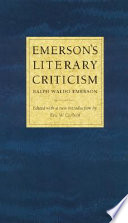 | Kevin P. Van Anglen - Literary Criticism - 1993 - 280 pages
...Apology of Smectymnuus" that Emerson quotes in the excerpt from "John Milton" just discussed (that" 'he who would not be frustrate of his hope to write...laudable things, ought himself to be a true poem; ... a composition and pattern of the best and honorablest things' "). Channing then treats these early... | |
 | Kevin Dunn - Literary Criticism - 1994 - 266 pages
...lies behind Milton's famous version of the ancient dictum that a good orator must be a good man:30 "He who would not be frustrate of his hope to write well hereafter in laudable things, ought him selfe to bee a true Poem, that is, a composition, and patterne of the best and honourablest things"... | |
 | Carl R. Woodring, James Shapiro - Literary Criticism - 2007 - 764 pages
...activity as the final preparation for a heroic poem. As he puts it in the Apology, "he who would . . . write well hereafter in laudable things, ought himself to be a true poem," presumably, in his case, by involvement in a just cause. In the Reason of Church Government Milton... | |
 | Don H. Bialostosky, Lawrence D. Needham - Language Arts & Disciplines - 1995 - 330 pages
...breeding. (DO 24) Cicero's point is not far from Milton's observation in the Apology for Smectymnuus that "he who would not be frustrate of his hope to write...laudable things, ought himself to be a true poem, that is, a composition and pattern of the best and honorablest things" (Milton 694), a remark that... | |
 | John T. Shawcross - English poetry - 1995 - 292 pages
...later in An Apology (p. 16): And long it was not after, when I was confirm'd in this opinion, that he who would not be frustrate of his hope to write well hereafter in laudable things, ought him selfe to bee a true Poem, that is, a composition, and patterne of the best and honourablest things;... | |
 | Ralph Waldo Emerson - Literary Collections - 1995 - 304 pages
...all the offices, both private and public, of peace and war." He declared that "he who would aspire to write well hereafter in laudable things, ought himself to be a true poem; that is, a composition and pattern of the best and honorablest things, not presuming to sing high praises... | |
 | John T. Shawcross - Literary Criticism - 1995 - 500 pages
...Horace's advice. . . . Milton with great depth of judgment observes in his Apology for Smectymnuus, that he who would not be frustrate of his hope to write well in laudable things, ought himself to be a true poem, that is, a composition of the best and honorablest... | |
 | William Riley Parker - Poets, English - 1996 - 708 pages
...which we have already noted: 'And long it was not after when I was confirmed in this opinion: that he who would not be frustrate of his hope to write...in laudable things ought himself to be a true poem, that is, a composition and pattern of the best and honourablest things, not presuming to sing high... | |
 | Kevin Pask - Literary Criticism - 1996 - 238 pages
...thoughts, without transgression. And long it was not after, when I was confirm'd in this opinion, that he who would not be frustrate of his hope to write well hereafter in laudable things, ought him selfe to bee a true Poem, that is, a composition, and patterne of the best and honourablest things;... | |
 | Elizabeth Sauer - Language Arts & Disciplines - 1996 - 230 pages
...practices. In An Apology against a Pamphlet Milton describes the exemplary author in terms of a poem: "he who would not be frustrate of his hope to write well hereafter in laudable things, ought him selfe to bee a true Poem, that is, a composition, and patterne of the best and honourablest things"... | |
| |